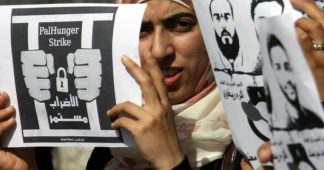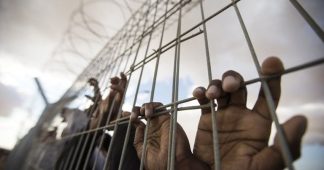New York Times Finally Reports on Trump’s Policy of Letting Guantánamo Hunger Strikers Die; Rest of Mainstream Media Still Silent
By Andy Worthington
11.10.17
So today, five days after the lawyer-led human rights organization Reprieve issued a press release, about how two of their clients had told them that, since September 20, prisoners on a long-term hunger strike were no longer being force-fed, and four days after I reported it (exclusively, as it turned out), the New York Times emerged as the first — and so far only — mainstream media outlet to cover the story, although even so its headline was easy to ignore: “Military Is Waiting Longer Before Force-Feeding Hunger Strikers, Detainees Say.”
As Charlie Savage described it, military officials at Guantánamo “recently hardened their approach to hunger-striking prisoners,” according to accounts given by prisoners to their lawyers, “and are allowing protesters to physically deteriorate beyond a point that previously prompted medical intervention to force-feed them.”
“For years,” Savage continued, “the military has forcibly fed chronic protesters when their weight dropped too much. Detainees who refuse to drink a nutritional supplement have been strapped into a restraint chair and had the supplement poured through their noses and into their stomachs via nasogastric tubes.”
But “around Sept. 19,” according to Clive Stafford Smith, Reprieve’s founder, “guards stopped taking hunger-striking detainees to feeding stations,” a change “reported by two Reprieve clients who had been subjected to tube feedings,” as explained in Reprieve’s original press release and in my article, “and corroborated by several other clients.”
Reprieve’s clients are Khalid Qassim (aka Qasim), a Yemeni, and Ahmed Rabbani, a Pakistani, and Charlie Savage was also told by David Remes that one of his clients, Abdul Salam al-Hela (aka al-Hilal), a Yemeni, had been on a hunger strike since August “but had not been tube-fed despite losing significant weight.” Al-Hela “also told him that other protesters were no longer being force-fed.”
One of those other prisoners is Sharqawi al-Hajj, another Yemeni, who I mentioned in my article on Friday based on reports made public about him last month, which I reported here. As his attorney, Pardiss Kebriaei of the Center for Constitutional Rights, told Charlie Savage, he “was hospitalized in July, though he eats a small amount of solid food each day to accompany pain medication.” On Sept. 21, he told Kebriaei that “a prison official told him a day earlier that he would not be forcibly tube-fed, either.”
All four of these men are amongst the 26 men (out of the remaining 41) who are not approved for release, but are not facing trials either. Between 2013 and 2016, they had their cases reviewed by Periodic Review Boards, a parole-type initiative of President Obama’s, but had their ongoing imprisonment upheld. The PRBs continue to assess their cases, but, in most it not all of them, it seems clear that the authorities have decided that they should continue to be held without charge or trial, because they are regarded, whether rightly or wrongly, as an ongoing security threat.
The lawyers who spoke to Charlie Savage also told him about a fifth prisoner, identified as a hunger striker by other prisoners, although he “does not have a lawyer,” and it is not known which category of prisoner he is. As well as the 26 men subjected to the PRBs, five of the men still held were approved for release but not freed before Obama left office, while ten are facing, or have faced trials.
In a statement, Navy Capt. John Robinson, a spokesman for the prison, said, as Savage described it, that “an 11-year-old military policy permitting the involuntary feeding of hunger-striking detainees remained in effect,” contradicting what the prisoners had told their lawyers.
Capt. Robinson explained, as the Times put it, that “[i]f medical officials decided tube-feeding was required to prevent death or serious self-harm,” the military would act accordingly. As he put it, “we would involuntarily enterally feed a detainee” — the military’s euphemism for force-feeding.
Capt. Robinson refused to discuss individual cases, but claimed that the military had not “involuntarily enterally fed a detainee in well over a year,” although it is, of course, impossible to ascertain whether or not this is true.
Savage pointed out that Capt. Robinson “would not elaborate on what it would mean to be voluntarily tube-fed,” but Pardiss Kebriaei “said it was most likely a reference to detainees who passively submitted to the procedure rather than fighting guards.”
A Pentagon spokesman, Maj. Ben Sakrisson, told the Times that “prison officials had decided to start to more rigorously enforce existing policy standards for what health conditions were sufficient to prompt force-feeding.” As he put it, “In some instances in the past, attempts to provide detainees who claimed that they were on hunger strike with a measure of dignity through voluntary enteral feedings unintentionally created a situation that potentially encouraged future hunger strikes. As a result, the pre-existing standard of medical necessity will be enforced in the future.”
Perhaps that makes sense to you, but to me it sounds like a deliberate attempt to bamboozle critics of the new policy that prisoners have been telling their lawyers about. As Charlie Savage described it, David Remes “interpreted the move as a new strategy to induce hunger strikers to stop,” and “accused the military of ‘playing chicken’ by withholding both force-feeding and medical care until the detainee was in danger of organ damage or even death.”
As he put it, “The theory is that a detainee won’t want to reach that point and so will abandon his hunger strike. Who will blink first?”
Who indeed? If a prisoner does refuse to give up a hunger strike, then surely the refusal to force-feed them or to offer them medical care risks them dying; and, in fact, makes that a possible or probable outcome.
Charlie Savage pointed out that the prisoners’ lawyers are in a difficult position, because many have argued in the past that “force-feeding amounts to torture and violates medical ethics” (all of which is true), but of course allowing men to die is difficult to accept. “For now,” as he put it, “the three lawyers said they are seeking independent medical evaluations of their clients,” although of course the prisoners themselves are on hunger strikes because they seek some sort of justice that is permanently denied to them.
As the Times put it, David Remes “said his client was protesting because he wanted the military to permit him to talk to his family twice a month rather than once,” Pardiss Kebriaei “said her client was in a general state of despair and might be suffering from an untreated illness,” and Clive Stafford Smith “said his clients were protesting because they wanted to be given trials or released.”
Their desire will come into even sharper relief if, as scheduled, military officials in the near future deliver a sentencing hearing for Ahmed al-Darbi, a Saudi prisoner who, in February 2014, accepted a plea deal in his military commission proceedings, in which, in exchange for testifying against other prisoners facing trials, he would be returned to Saudi Arabia next February to serve the remainder of his sentence.
As I explained two months ago, when he first began testifying as agreed, his plea deal shows the essential absurdity of Guantánamo, because, as the US government prepares to release him, it is also saying to less significant prisoners that they, on the other hand, will remain trapped at Guantánamo forever.
* Andy Worthington is a freelance investigative journalist, activist, author, photographer, film-maker and singer-songwriter (the lead singer and main songwriter for the London-based band The Four Fathers, whose music is available via Bandcamp). He is the co-founder of the Close Guantánamo campaign (and the Countdown to Close Guantánamo initiative, launched in January 2016), the co-director of We Stand With Shaker, which called for the release from Guantánamo of Shaker Aamer, the last British resident in the prison (finally freed on October 30, 2015), and the author of The Guantánamo Files: The Stories of the 774 Detainees in America’s Illegal Prison (published by Pluto Press, distributed by the University of Chicago Press in the US, and available from Amazon, including a Kindle edition — click on the following for the US and the UK) and of two other books: Stonehenge: Celebration and Subversion and The Battle of the Beanfield. He is also the co-director (with Polly Nash) of the documentary film, “Outside the Law: Stories from Guantánamo” (available on DVD here — or here for the US).
Andy Worthington is a freelance investigative journalist, activist, author, photographer, film-maker and singer-songwriter (the lead singer and main songwriter for the London-based band The Four Fathers, whose music is available via Bandcamp). He is the co-founder of the Close Guantánamo campaign (and the Countdown to Close Guantánamo initiative, launched in January 2016), the co-director of We Stand With Shaker, which called for the release from Guantánamo of Shaker Aamer, the last British resident in the prison (finally freed on October 30, 2015), and the author of The Guantánamo Files: The Stories of the 774 Detainees in America’s Illegal Prison (published by Pluto Press, distributed by the University of Chicago Press in the US, and available from Amazon, including a Kindle edition — click on the following for the US and the UK) and of two other books: Stonehenge: Celebration and Subversion and The Battle of the Beanfield. He is also the co-director (with Polly Nash) of the documentary film, “Outside the Law: Stories from Guantánamo” (available on DVD here — or here for the US).











